仁爱英语九年级上Unit 2 Topic2 Section D -第二节
仁爱九年级上册第二单元Unit 2 Topic2 Section D(共15张PPT)

5. S—to—p t—he—fa—ct—ori—es—fr—om—p—ou—ri—ng—w—ast—e w—a—ter—in—to rivers. 6. ——Do—n—’t t—hr—ow—l—itte—r —int—o —the—w—at—er———
7. _A_f_te_r_w_e__w_a_s_h_c_lo_t_h_e_s_o_r_v_e_ge_t_a_b_le_s_, _w_e_c_a_n_r_e_u_s_e__ … the water to clean the floor.
stop…from…, pour…into…, turn off, tap(水龙头), wash clothes/vegetables, clean the floor, throw…into…
1. Why is our earth thirsty when ¾ of the earth is covered with water? Because about 97% of the water on the earth is sea water and we can’t use it for watering plants or drinking directly.
can’t live without water.
water on the earth
While there is so much water around the world, Nweeahrluymtharnese aforuertshtsillosf hthoerteoafrtdhriisnkcionvgerwedatwerit.h water.
Unit2 Topic2SectionD教案 仁爱版九年级英语上册
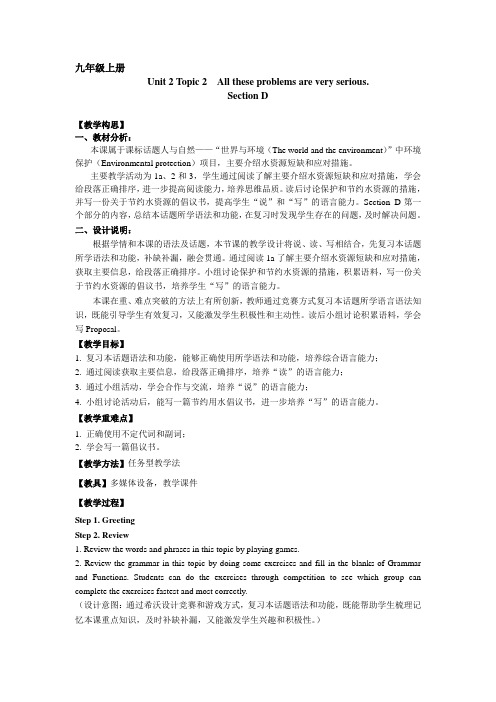
九年级上册Unit 2 Topic 2 All these problems are very serious.Section D【教学构思】一、教材分析:本课属于课标话题人与自然——“世界与环境(The world and the environment)”中环境保护(Environmental protection)项目,主要介绍水资源短缺和应对措施。
主要教学活动为1a、2和3,学生通过阅读了解主要介绍水资源短缺和应对措施,学会给段落正确排序,进一步提高阅读能力,培养思维品质。
读后讨论保护和节约水资源的措施,并写一份关于节约水资源的倡议书,提高学生“说”和“写”的语言能力。
Section D第一个部分的内容,总结本话题所学语法和功能,在复习时发现学生存在的问题,及时解决问题。
二、设计说明:根据学情和本课的语法及话题,本节课的教学设计将说、读、写相结合,先复习本话题所学语法和功能,补缺补漏,融会贯通。
通过阅读1a了解主要介绍水资源短缺和应对措施,获取主要信息,给段落正确排序。
小组讨论保护和节约水资源的措施,积累语料,写一份关于节约水资源的倡议书,培养学生“写”的语言能力。
本课在重、难点突破的方法上有所创新,教师通过竞赛方式复习本话题所学语言语法知识,既能引导学生有效复习,又能激发学生积极性和主动性。
读后小组讨论积累语料,学会写Proposal。
【教学目标】1. 复习本话题语法和功能,能够正确使用所学语法和功能,培养综合语言能力;2. 通过阅读获取主要信息,给段落正确排序,培养“读”的语言能力;3. 通过小组活动,学会合作与交流,培养“说”的语言能力;4. 小组讨论活动后,能写一篇节约用水倡议书,进一步培养“写”的语言能力。
【教学重难点】1. 正确使用不定代词和副词;2. 学会写一篇倡议书。
【教学方法】任务型教学法【教具】多媒体设备,教学课件【教学过程】Step 1. GreetingStep 2. Review1. Review the words and phrases in this topic by playing games.2. Review the grammar in this topic by doing some exercises and fill in the blanks of Grammar and Functions. Students can do the exercises through competition to see which group can complete the exercises fastest and most correctly.(设计意图:通过希沃设计竞赛和游戏方式,复习本话题语法和功能,既能帮助学生梳理记忆本课重点知识,及时补缺补漏,又能激发学生兴趣和积极性。
九年级上学期英语(仁爱版)教案:Unit2__Topic2__SectionD__教学设计

Unit2 Topic2 SectionD 教学设计Ⅰ. Material analysis本课是第二单元第二话题的第四课时,是本话题的复习课,主活动是1a和Project。
通过Grammar和Functions让学生归纳总结本话题的语法知识——不定代词和不定副词的用法,以及一些重要的表达。
通过1a部分,培养学生寻找段落之间的逻辑关系,再利用逻辑关系完成排序任务。
1b引导学生在阅读过程中注意“wh-questions”,提高阅读效率。
2是通过小组讨论的方式,探究保护水资源和和节约用水的方法,为3的写作任务作铺垫。
3是教会学生如何写倡议书,培养学生在写作中排篇布局,即先构建写作框架,再加上合理的观点。
Project是通过让学生换位思考,充当不同的自然资源,描述各自的功能,现状和期望,来唤起大众保护环境的意识。
本课所设置的“写倡议书”和“制作海报”都在培养学生“用英语做事情”的能力。
Ⅱ. Teaching aims1.Knowledge aims:掌握本课的重点词汇和短语,复习不定代词,不定副词和重点表达法。
了解淡水资源短缺的现状。
2.Skill aims:培养学生通过wh-questions(如:what,why等),理解短文的意思。
能够读懂有关自然资源的文章。
能够利用已有框架,加上自己的观点,提高写作技能。
3.Emotional aims: (optional)关注自然资源的现状,倡导学生保护环境,节约用水。
4.Culture awareness:(optional)通过对水资源现状的了解,认识到自然资源对人类的重要性,加入到保护环境、珍惜资源的队伍中。
Ⅲ. The key points and difficult points1. Key points:Words and phrases: avoid, discover, thirsty, nearly, law, shortage, resource, reuse,take sth. away from…, the shortage of water / water shortage, avoid (doing) sth., make progress in, nearly 3/4 of…2. Difficult points:学会归纳话题中的重点语法和表达法。
仁爱英语九年级教材讲解Unit2知识点击

Unit 2 Topic 1 Section ANew wordsNew phrasesUseful expressions知识点击1.……and you could see bees and butterflies dancing.……你能看见蜜蜂和蝴蝶在飞舞。
see...doing意为“看见……正在做……",see 此处用作感官动词,可以加宾语再加宾补。
进口袋。
Andy saw his toy dog hidden behind the door.安他看见他的玩具狗被藏在门后。
【拓展】其他的感官动词,如hear,watc 也有类似的用法。
如:Tony heard someone singing songs in the next door.托尼听到有人正在隔壁房间唱歌。
Every day lots of people go to the Tian'anmen Square to watch the flag go up.每天很多人去天安门广场看升红旗。
2.The flowers and grass have gone!鲜花和绿草都消失了!go在此处为不及物动词,意为“不复存在,不见了”。
如:The pain has gone.疼痛消失了。
【链接】go还有“变得,进展”等意思。
如:The fish is going bad.鱼快变质了。
Everything goes well. 一切都好。
3.Look,there are several chemical factories pouring waste water into the stream.看,有几个化工厂正往小溪里排放废水。
(1)pour...into…意为"向……投入"。
如:The government has poured millions of yuan into education.政府在教育上投资数百万元。
仁爱英语九年级 Unit2 Topic2 翻译

Unit2 Topic2Section A(康康、玛利亚和简正在房间里谈话,,外面的风刮得很厉害。
)多么糟糕的天气!风太大了!沙子的确刮得脸很疼。
刚才在街上走时,我什么也看不见。
对此我很难过。
但是是什么引起这些沙尘暴的呢?人们乱砍滥伐。
结果,大量肥沃的土地变成了荒漠。
那太糟糕了,但是那怎么能影响天气呢?树木可以防风固土。
并且森林可以贮存大量的水分。
树木也能防止水土流失。
砍伐树木对人类、动植物都有害。
尽管我们已经建起了“绿色长城”,我们仍需要采取措施保护环境。
Section B康康,读这篇文章。
关于什么的?关于中国的空气污染问题。
它提到中国已成为世界上最大的煤炭生产国和消费国。
结果,空气污染成已成为一个严重的问题。
是的,但是政府为了保护环境正在采取有效的措施。
那样很好。
没有人喜欢污染。
我们不应该到处丢弃垃圾。
不要在公共场合随地吐痰。
不要践踏草坪或采摘花朵。
每个人都应当保护野生动物并且多种一些树木。
对。
我们应尽一切努力保护环境。
Section C地球已有46亿年了。
我们人类生活在地球上只有三万五千年,但是在此期间我们在许多方面改变了我们的星球。
我们所做的一些事情对地球有益,然而其他一些对地球却有负面影响。
在全世界,人们已经砍掉了数百万的树木。
下雨或吹风时,土壤被带走,森林变成了荒漠,因此许多种类的动植物正在灭绝。
在大城市,小车和公交车污染了空气,现在城市里许多人都有健康问题。
工厂也污染了土地和水。
结果,现在许多河流和湖泊失去了生机。
地球周围有一种特殊的氧气叫做“臭氧”(O3),它对地球很重要。
但现在空气污染正在破坏它,而且使臭氧层出现了一个非常大的洞。
大量来自太阳的有害射线穿过这个洞直接进入地球大气层。
这是非常危险的,因为这种射线能导致癌症。
空气中的二氧化碳(CO2)大量增多。
二氧化碳主要来自燃烧的油、煤和木柴。
它在地球周围形成毯子式的覆盖层。
来自太阳的热量不能散发,所以气温度升高。
这就是所谓的“温室效应”。
仁爱英语九年级unit2topic2sectionDPPT课件

Topic2 All these problems are very serious.
Sectio源共享
1
2021/3/12
2
How many environmental problems do you know? Which one do you think is the most serious? What can you do to solve it/ them?
Every year, people in Hong Kong produce about 5 million tons of waste. Of all the garbage, about 35 percent can be recycled while the rest can’t.
The garbage produced every day has become a serious problem around the world. How shall we deal with it?
2021/3/12
6
take up 占去,占用(时间或空间)
E.g. Doing housework takes up most of my mother’s weekend.
My little brother’s toys took up much space of his bedroom when he was young.
2021/3/12
3
Imagine you are one tree. Please tell us your functions, problems and wishes.
2021/3/12
仁爱英语 九年级上册Unit 2 Topic 2 课文翻译

Unit 2 Topic 2 All these problems are very serious.所有这些问题都非常严重Section A(Kangkang,Maria and Jane are talking in a room. The wind outside is blowing strongly.)(康康、玛利亚和简正在房间里谈话,,外面的风刮得很厉害。
)What bad weather! The wind is so strong! And the sand really hurt my face. while I was walking down the street just now,I couldn't see anything.多么糟糕的天气!风太大了!沙子的确刮得脸很疼。
刚才在街上走时,我什么也看不见。
I'm sorry to hear that. But what causes these sandstorms? 对此我很难过。
但是是什么引起这些沙尘暴的呢?People have cut down too many trees. As a result,a lot of rich land has changed into desert.人们乱砍滥伐。
结果,大量肥沃的土地变成了荒漠。
That's bad. How can that affect the weather? 那太糟糕了,但是那怎么影响天气呢?Trees can stop the wind from blowing the earth away. 树木可以防风固土。
And a lot of water can be saved by forests. 并且森林可以贮存大量的水分。
They can also stop the water from washing the earth away. 树木也能防止水土流失。
Unit 2 Topic 2 Section D 公开课教学设计(九年级英语上册仁爱版)

Unit 2 Saving the EarthTopic 2 All these problems are veryserious.Section D教学设计一、教学目标1. 掌握本课重点词汇:avoid, thirsty, nearly, law, shortage, resource, reuse2. 综合复习不定代词、不定副词。
3. 读懂并理解有关自然资源的文章。
4. 帮助学生了解水资源现状,认识到自然资源对人类的重要性,加入到保护环境、珍惜资源的队伍中。
二、教学重点及难点重点:1. 掌握本课重点词汇的运用。
2. 综合复习不定代词、不定副词。
3. 读懂并理解有关自然资源的文章。
难点:帮助学生了解水资源现状,认识到自然资源对人类的重要性,加入到保护环境、珍惜资源的队伍中。
三、教学过程Step 1 Revision1. Guide Ss to fill in the blanks by using indefinite pronoun and adverb.【设计意图】通过练习,帮助学生复习不定代词和不定副词,进一步掌握用法。
2. Guide Ss to fill in the blanks with the words learnt in Section A-C.【设计意图】通过练习,进一步巩固对词汇短语的掌握和运用。
Step 2 Pre-reading1. Guide Ss to look at the picture and learn something about water resource.【设计意图】在正式进入文本阅读之前,让学生了解关于水资源的现状。
2. Guide Ss to talk about the functions, problems and wish of water.【设计意图】通过讨论,引导学生了解水的用途,问题等背景信息,让学生认识到自然资源对人类的重要性,加入到保护环境、珍惜资源的队伍中。
16年仁爱英语九年级上册_Unit_2_topic_2_重点知识点eva
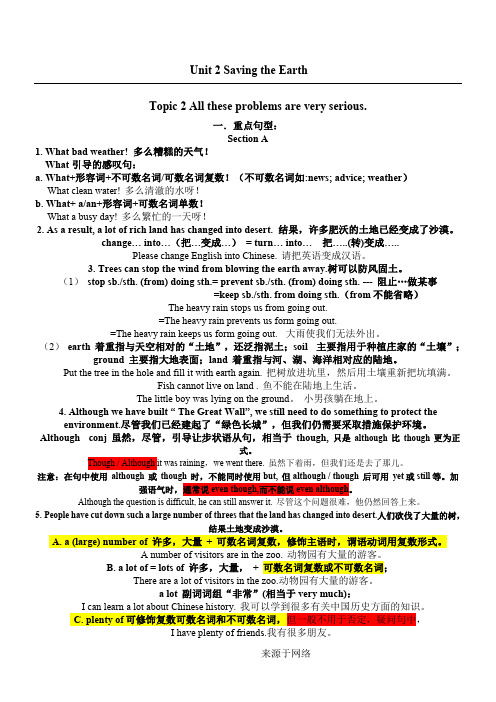
Unit 2 Saving the EarthTopic 2 All these problems are very serious.一.重点句型:Section A1. What bad weather! 多么糟糕的天气!What引导的感叹句:a.What+形容词+不可数名词/可数名词复数!(不可数名词如:news; advice; weather)What clean water! 多么清澈的水呀!b.What+ a/an+形容词+可数名词单数!What a busy day! 多么繁忙的一天呀!2. As a result, a lot of rich land has changed into desert. 结果,许多肥沃的土地已经变成了沙漠。
change… into…(把…变成…)= turn… into… 把…..(转)变成…..Please change English into Chinese. 请把英语变成汉语。
3. Trees can stop the wind from blowing the earth away.树可以防风固土。
(1)stop sb./sth. (from) doing sth.= prevent sb./sth. (from) doing sth. --- 阻止…做某事=keep sb./sth. from doing sth.(from不能省略)The heavy rain stops us from going out.=The heavy rain prevents us form going out.=The heavy rain keeps us form going out. 大雨使我们无法外出。
(2)earth 着重指与天空相对的“土地”,还泛指泥土;soil 主要指用于种植庄家的“土壤”;ground 主要指大地表面;land 着重指与河、湖、海洋相对应的陆地。
仁爱英语九年级上册Unit 2 Topic2 Section D
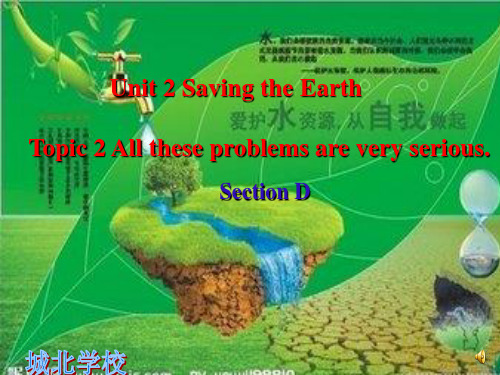
预习导纲
一.读1a内容,在文中找出下列短语并画出来然后朗读。 1.似乎有最佳答案_____ 2.从海水中提取出盐 _______ 3.解决水短缺问题________ 4.保护水资源________ 5.在这领域取得些进步______ 6.一天一天地______ 7. 将近3/4的地球______ 8.由---覆盖 _______ 9.缺少饮水_______ 10.使用淡水_______
water pollution
Imagine you are water. Please tell us your functions, problems and wishes.
I’m water. I used to be … Factories usually pour … I wish human beings …
3.While nearly ¾ of the earth is covered with water , we are still short of drinking water. 译:_____。
探究:nearly__词,意为___.常可与almost换用,但在 具体数字前常用nearly. not修饰nearly 意为“远非”, “远不及”。 almost 可以修饰more than, too, nothing, nobody, nowhere, no one, none, never 等词,nearly 则不行. 如: He almost knocked me down before he saw me. Almost no one(=Hardly anyone)believes her.几乎没有 人相信她 练一练:My eyesight was___ destroyed in that accident .Thanks to Dr Beker,I enjoy the beautiful world again. pletely B.hardly C.quickly D.nearly
仁爱版英语九年级上册unit2教案

仁爱版英语九年级上册unit2教案教案要面向全体学生,关注每个学生的情感,激发他们学习英语的兴趣,帮助他们建立学习的成就感和自信心,使他们在学习过程中发展综合语言运用能力,下面是我给大家整理的仁爱版英语九年级上册unit2教案5篇,希望对大家能有所帮助!仁爱版英语九年级上册unit2教案1Unit1TheDevelopingWorldTopic1ChinahasdevelopedrapidlyInrecentyears.SectionAThemainactivityis1a.本课重点活动是1a。
Ⅰ.Teachingaimsanddemands教学目标1.Learnsomenewwordsandaphrase:proper,bytheway,bell,grandpa,chairwoman,grandson2.Learnausefulsentence:Theregoesthebell.3.Learnthepresentperfecttense:(1)Rita,youhavejustcomebackfromyourhometown.(2)—Wherehaveyoubeen,Jane?—IhavebeentoMountHuangwithmyparents.(3)—Bytheway,where’sMaria?—ShehasgonetoCubatobeavolunteer…4.Taltthechildren’svacationexperiences.Ⅰ.Teachingaids教具录音机/小黑板/学生的旅游纪念照/图片/幻灯片Ⅰ.Five-fingerTeachingPlanStep1Review通过教师询问学生的暑期活动,导入话题,呈现部分生词。
T:Listen!Thebellisringing.Let’sbeginourclass!(教师解释Thebellisringing等于Theregoesthebell,板书bell,要求学生掌握。
2019-2020年九年级英语上册《Unit 2 Saving the Earth》Topic 2 SectionD 教案 仁爱版

2019-2020年九年级英语上册《Unit 2 Saving the Earth》Topic 2SectionD 教案仁爱版The main activities are 1a和4. 本课重点活动是1a和4。
Ⅰ. Teaching aims and demands 教学目标1. Learn a new phrase:take up2. Learn some useful sentences:(1) This harms the environment …(2) At the same time, dealing with …(3) Of all the garbage, about 35 percent can be recycled while the rest can’t.(4) How shall we deal with it?3. Review the indefinite pronoun and adverb:(1) None of us likes pollution.(2) Don’t spit anywhere in public.(3) Everyone should care for wild animals and plant more trees.(4) We should do everything we can to protect the environment.4. Talk about the harm of rubbish.5. Go on developing the students’ sense of environmental protection.Ⅱ. Teaching aids 教具图片/录音机/小黑板Ⅲ. Five-finger Teaching Plan 五指教学方案Step 1 Review 第一步复习(时间:5分钟)检查作业,然后通过师生对话,复习Section C的内容,为学习新词汇作准备。
仁爱版九年级英语上册Unit2 Topic2课件(共62张PPT)
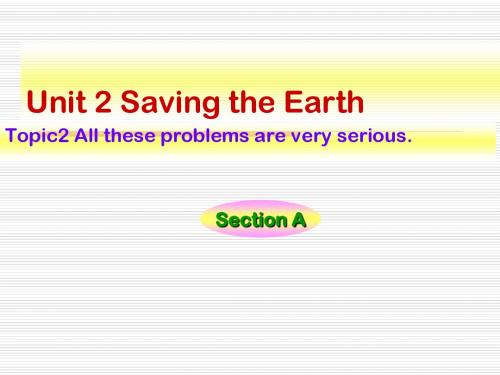
e.g. A lot of rich land has changed into desert because people have cut down too many trees.
sandstorms
come into being
n. 沙尘暴
1 change into... 变成……。 e.g. Water has changed into steam. 水变成了蒸气。 2 stop/prevent sb./sth. (from) doing sth. 阻 止某人/某物做某事,from可以省略。 e.g. The heavy snow stopped/prevented the visitors (from) leaving the top of the mountain. 大雪使游人不得不停留在山顶上。
表否定含义
everybody, everyone, everything, everywhere
可用于各种句式
Do you know?
B to tell you. 1.I have ____ A. important something B. something important
形容词修饰不定代词和不定副词时,要放在不定代词/不定副之后
the indefinite pronoun and adverb
somebody, someone, something, somewhere
一般情况下用于肯定句
anybody, anyone, anything, anywhere
一般情况下用于否定句和疑问句
none, nobody, nothing, nowhere
3 earth着重指与天空相对的“土地”,还泛指泥 土;soil要指用于种植庄稼的“土壤”;ground主 要指大地表面;land着重指与河、湖、海洋相对的 陆地。 e.g.Put the tree in the hole and fill it with earth again. 把树放进坑里,然后用土重新将坑填满。Light, water, air and soil are essential to plant life. 光、水分、空气和土壤对植物生长是不可缺少的。 The bag fell on the ground. 那个包掉到地上了。 A lot of good lands have gone. 大片的良田消失了。
仁爱版九年级上册英语二单元Topic2课件
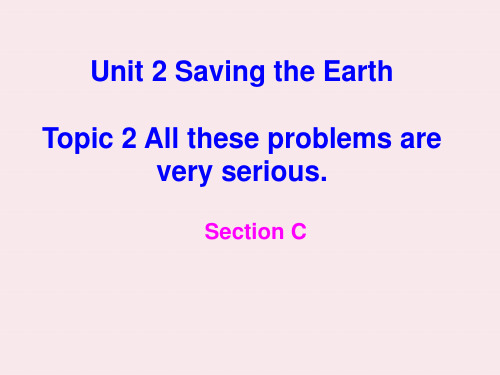
n.洞,坑
臭氧层
a very big hole in the ozone layer, too much harmful radiation from the sun
放射,放射物
In our daily life, we should face more environmental problems. Can you say something about them?
拿走
In our daily life, we should face more environmental problems. Can you say something about them?
oxygen
- 1、下载文档前请自行甄别文档内容的完整性,平台不提供额外的编辑、内容补充、找答案等附加服务。
- 2、"仅部分预览"的文档,不可在线预览部分如存在完整性等问题,可反馈申请退款(可完整预览的文档不适用该条件!)。
- 3、如文档侵犯您的权益,请联系客服反馈,我们会尽快为您处理(人工客服工作时间:9:00-18:30)。
This is because about 97% of the water on the earth is sea wate So we can't use it for watering plants or drinking directly.
sea water fresh water
Humans can only drink and use fresh water from places including rivers, lakes and underground.
avoid 2. How can we _________( 避免) a serious water shortage? discover 3. We should __________( 找到) ways to reuse water. day by day 4. People’s need for water is increasing ____________( 一 天天). 5. Although the world is hungry, it is even thirstier ______(更渴的) nearly 6. While ___________( 几乎,差不多)¾ of the earth is covered with water, we are still short of drinking ater.
How can we avoid a serious water shortage?
First, we should save water and not waste it.
Second, we should protect our water resources and not pollute them.
Assignment
• • Read 1a. Review the useful expressions and key sentences which we learn in this topic. Preview Section A in Topic 3.
•
We still don't have enough water.
What else can we do?
The sea seems to have the best answer. There is plenty of water in the sea.
But we need to take the salt away from the sea water. This is very expensive.
Third, we should discover ways to reuse water.
Scientist have made some progress in this field. Today, some big cities are reusing water.
But people's need for water is increasing day by day.
If scientists can find cheaper ways, we can solve the problem of the shortage of water.
晒盐法
take away 1. If we want to use the sea water, we must ______ ___(拿 走) the salt from the sea water.
Section D
Although the world is hungry, it's even thirstier.
While nearly 3/4 of the earth is covered with water,
we are still short of drinking water.
